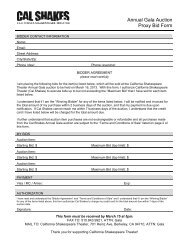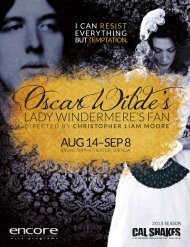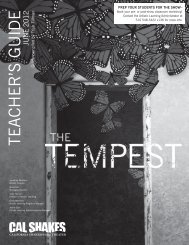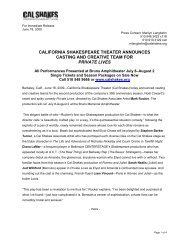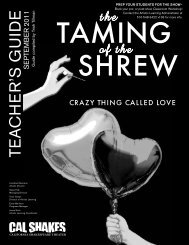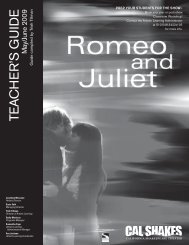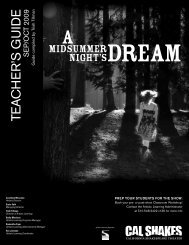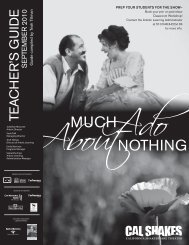Twelfth Night teacher's guide - California Shakespeare Theater
Twelfth Night teacher's guide - California Shakespeare Theater
Twelfth Night teacher's guide - California Shakespeare Theater
You also want an ePaper? Increase the reach of your titles
YUMPU automatically turns print PDFs into web optimized ePapers that Google loves.
MAKING AN ENTRANCE: Viola/Cesario<br />
“I am all the daughters of my father’s house,<br />
and all the brothers too.” -Viola, Act 2, Scene 4<br />
Viola decides to disguise herself as a young man in order to find service in Orsino’s court.<br />
She does this because she needs to survive in the new country of Illyria where she has<br />
washed ashore. She also does it for quite practical reasons—Olivia’s court is not hiring while<br />
Olivia remains in mourning, and Orsino’s court will not hire female servants.<br />
Viola comes from outside the city, cast there by shipwreck, and is forced to play by the rules<br />
of this strange new world. She knows the truth even as the people get crazier around her,<br />
and she exposes their foolishness just by understanding her own so clearly, even as she<br />
is trapped in her own disguise. Eventually she reveals to them their blindness when she is<br />
reunited with her brother Sebastian and everyone can finally love the right person. She is the<br />
one who makes everyone finally understand reality, even when they wish to be deluded.<br />
Many people wonder why <strong>Shakespeare</strong> included so many situations of women dressing as<br />
men in his plays. Besides Viola, there is Rosalind in As You Like It, Imogen in Cymbeline,<br />
and Portia in The Merchant of Venice. There are many possible reasons for this. Perhaps<br />
<strong>Shakespeare</strong> wanted to illustrate the fact that women could not move independently in<br />
society, so they had to act like men. This was a situation familiar to the public since their<br />
monarch was Queen Elizabeth, who was determined to prove that a woman could defy traditional views and rule<br />
one of the most powerful countries in the world. However, it is fairly certain is that <strong>Shakespeare</strong> enjoyed (and<br />
knew the audience would enjoy) the confusions and comedy that can result from such a disguise. Orsino is<br />
puzzled by how feminine Cesario appears, Olivia is confused by how unwilling to fall in love with her Cesario is,<br />
and Sir Toby is disgusted at the lack of fighting skill Cesario has.<br />
As a heroine, Viola is clearly a strong figure: She does not retreat into mourning for her dead brother like Olivia,<br />
nor into romantic melancholy when she falls in love, like Orsino. She always makes her way clearly and calmly<br />
even in the midst of the crazy world where she has landed.<br />
Try This:<br />
Explorations of Gender Stereotypes<br />
Make two different collages of images of men and of women from popular magazines. Post them around<br />
the classroom. Ask the students to look at each collage and write down what they think the magazines<br />
are trying to tell them about being a man or a woman. Do you agree with the ideas being communicated<br />
to you? Why or why not?<br />
FOR DISCUSSION:<br />
Do you think men get certain opportunities in life that women don’t? Do women have opportunities that<br />
men don’t get? Why do you think that is?<br />
See page 22 for Male and Female Roles in <strong>Twelfth</strong> <strong>Night</strong>.<br />
PAGE 17




